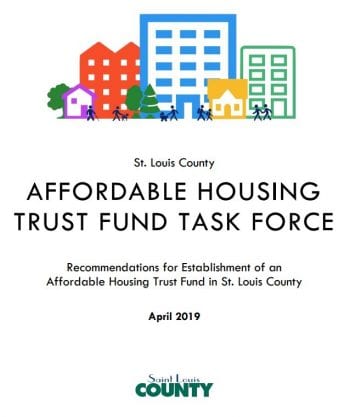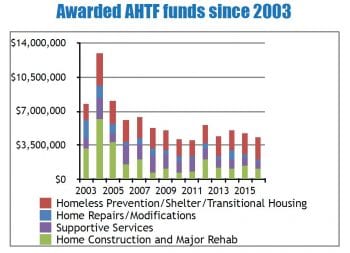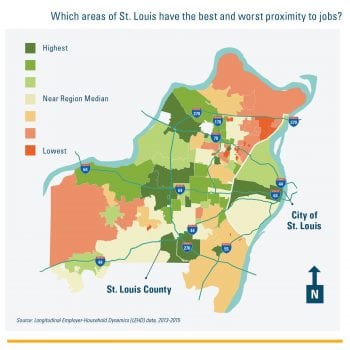
St. Louis County Executive Steve Stenger and members of the St. Louis County Affordable Housing Trust Fund Task Force released Recommendations for Establishment of an Affordable Housing Trust Fund in St. Louis County.
Affordable Housing Trust Funds (AHTFs) receive dedicated sources of public funding to support the preservation and production of affordable housing and increase opportunities for families and individuals to access decent, affordable homes. The creation of an AHTF was one of eleven recommendations in the Segregation in St. Louis: Dismantling the Divide report released last April by Health Equity Works and Arch City Defenders, Ascend STL, Metropolitan St. Louis Equal Housing and Opportunity Council (EHOC), Empower Missouri, and Team TIF. Last June’s executive order establishing the Task Force referenced “recent reporting by For the Sake of All and others [that] has affirmed conclusions regarding inequity in St. Louis County.”
The Task Force’s report concludes ten months of work, which included data review and research, consulting with affordable housing experts, surveying nearly 600 community members, and determining how to equitably address affordable housing throughout St. Louis County.
The Task Force considered the housing needs of renters, homeowners and special populations such as seniors, people with disabilities, and those who are unhoused. They identified interventions to help stabilize housing and improve affordability and quality in line with six goals:
- Increase housing stability
- Provide prevention services (e.g., rental assistance, foreclosure prevention, legal services, housing counseling, and rapid re-housing)
- Preserve existing affordable and accessible housing
- Increase quality, affordable and accessible housing options
- Promote mobility to areas of opportunity
- Align with communities where there are significant existing investments driven by community voice
Although there aren’t current funds dedicated to the AHTF, the Task Force suggests a designation of $30-$35 million annually, which would benefit approximately 5,750 of the 115,000 cost burdened households in St. Louis County. To generate this revenue the report recommends utilizing several different sources considered for their feasibility, political acceptability, and revenue-generating potential. Diversifying funding streams is a common practice for AHTFs across the country.
“Affordable Housing Trust Funds are a proactive, local solution to the growing affordability crisis right here in St. Louis,” says Gary Newcomer of the Community Builders Network of Metro St. Louis. “However, they are only as strong as the commitments made by local elected leaders. The most catalytic AHTFs around the country have dedicated and multi-layered funding sources that protect them from political and competing interests.”
Ultimately, the report finds that combining funds from a sales tax, use tax, tax increment financing, tax on the sale of medical marijuana, and a tax on the sale of recreational marijuana (should it become legal) has the greatest chance of generating the necessary funding.
In order to pass the proposed tax increases as outlined in the report there will need to be significant efforts to educate the public and policy makers on the benefits of having an AHTF.
The City of St. Louis paves the way
A similar effort took place in the City of St. Louis when a citizen’s advocacy group rallied support to create an AHTF, resulting in voters approving a use tax and successfully establishing a city fund in 2001.
“People power made it happen,” remarked Laura Barrett, campaign manager for the AHTF effort in the city and now Missouri Campaign Coordinator for SEIU Healthcare. “Unions like Service Employees International, faith congregations such as Metropolitan Congregations United, and advocacy groups like Adequate Housing for Missourians and Paraquad all lent their combined strength to the effort. We won by a much larger margin than expected and established the largest per capita housing trust fund in the country. The day after election day was one of the happiest and proudest days of my life.”
Recently, the city’s AHTF has been the center of much debate. It is solely funded by the city’s use tax—a tax that has brought in more revenue than anticipated. Initially created to fund affordable housing, the St. Louis Board of Alderman swiftly presented new legislation to propose that the use tax funds also support public health care services, public safety services, and building demolitions. Just one year after voters approved the use tax and the establishment of the Affordable Housing Trust Fund, they returned to the polls to vote on additional uses of the funds.
Each year the Board of Estimate and Apportionment decides how much of the tax will be used for each of these important issues. Meanwhile, members of the Board of Aldermen consider whether to introduce new legislation to reallocate portions of the funding to other areas like the recently proposed soccer stadium.

Credit: Chris Willcox, MSW
Two years ago a coalition of organizations formed the Affordable Housing Trust Fund Coalition to ensure that the fund was receiving the legally mandated $5 million annually and to work towards getting more funds committed to the city’s AHTF.
“The AHTF Coalition formed to build awareness and accountability around the AHTF so that St. Louis can both increase investment in affordable housing and improve the systems by which we fund solutions,” explained Newcomer, a coalition member. “Everyone has a right to a healthy and dignified life. Our coalition believes that AHTFs preserve, protect, and promote this right.”
Working families need affordable housing
Affordable housing is re-emerging as an issue for working families, spurring unions across the country to advocate on behalf of their members.
Historically, organized labor unions have supported the affordable housing movement as they see their issues as intertwined. At the turn of the century unions influenced policy to build and sometimes even sponsor affordable housing sites near factories and other workplaces where their members were employed.

Today rents and home values are soaring across the country, having a detrimental effect on the cost of living for workers already advocating for fair, living wages and negating the wage increases they’re receiving. Rising rents and housing prices can push working families out of once-affordable neighborhoods and into housing that is farther from their jobs, in turn increasing commuting costs and displacing people from the communities where they feel connected.
Housing advocates believe that housing is a human right. If St. Louis is to become a more equitable region, it must invest in affordable housing strategies. Access to quality, affordable housing provides families and individuals with a foundation for stability. Creating an Affordable Housing Trust Fund in St. Louis County and adequately funding the City of St. Louis’ Affordable Housing Trust Fund will ensure that funds are dedicated to meeting the needs of our region’s most vulnerable.